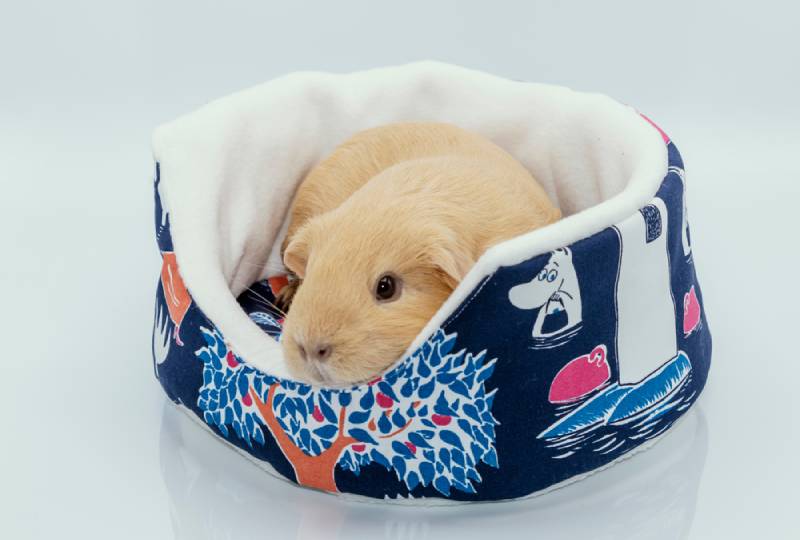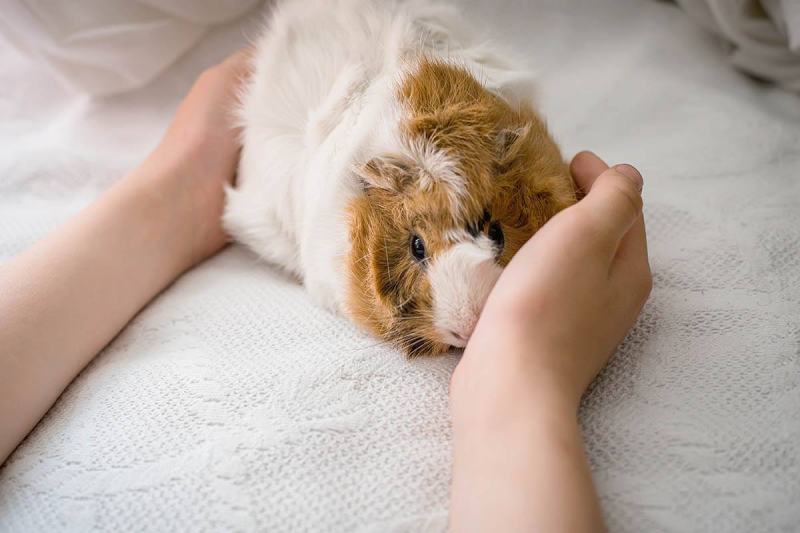Can Guinea Pigs Eat Watermelon? Vet-Approved Health Review

Updated on

Click to Skip Ahead
Guinea pigs, also known as cavies, are adorable and popular pets that are known for their love of fresh fruits and vegetables. As a responsible guinea pig owner, it’s essential to ensure that you are providing your furry friend with a healthy and balanced diet. But what about watermelon? Can guinea pigs eat watermelon?
In short, yes, they can! Watermelon can be a healthy treat for your guinea pigs as long as it is fed in moderation. If fed in excess, your guinea pig may experience digestive and health issues.
Still curious to learn more? Read on as we talk more about guinea pigs and watermelons!
Do Guinea Pigs Like Watermelon?
Guinea pigs are herbivores and can eat a variety of vegetables and some fruits as part of their diet. For us humans, watermelon is a juicy and refreshing fruit we can enjoy during the hot summer months. Because of the juicy, refreshing, and sweet nature of watermelons, most guinea pigs like watermelons too!
However, it is important to remember that guinea pigs have different taste preferences, and not all of them may be interested in watermelon. While some guinea pigs may enjoy the sweet taste and high water content of watermelon, others may not find it as appealing.
Is Watermelon Healthy for Guinea Pigs?
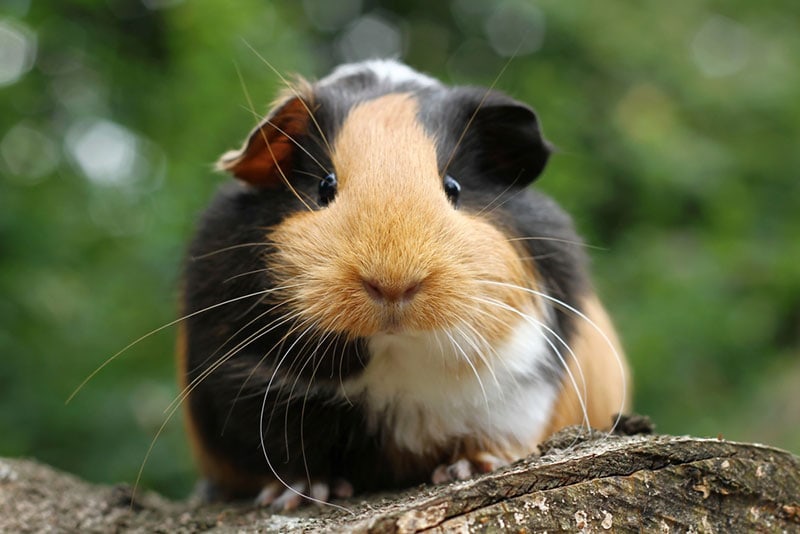
A guinea pig’s diet should mainly consist of hay, grass, fresh vegetables and guinea pig pellets. Fresh fruit, including watermelon, due to its high sugar content should only be offered in moderation and not as a diet staple.
Watermelon is a good source of hydration as it contains about 90% water. It also provides essential vitamins and minerals such as vitamin C, vitamin A, and potassium.
Vitamin C is especially important for guinea pigs as they cannot produce it on their own and require it in their diet. Vitamin C has been shown to boost the immune system and is essential for the normal development of skin, joints and mucosal surfaces like gums.
Watermelon also contains vitamin A, which plays a role in maintaining healthy eyesight, as well as boosting immune function and growth. The presence of potassium also helps in the health of your guinea pig’s muscles, nerves, and heartbeat regulation.
How Much and How Often Should Guinea Pigs Eat Watermelon?
Watermelon is high in natural sugars and should be fed to guinea pigs in small amounts as a treat. Too much sugar, even from natural sources such as watermelon, can easily put your guinea pig at risk for obesity and digestive issues.
A good rule of thumb is to feed a small piece of watermelon as a treat no more than once or twice a week and remove the seeds before feeding it. A slice of watermelon about the size of your guinea pig’s paw is a suitable portion size.
It is important to monitor your guinea pig’s reaction to watermelon and ensure that it doesn’t cause any digestive issues. Be sure to consult with your veterinarian as well before incorporating any new food into your guinea pig’s diet.
Risks of Eating Too Much Watermelon
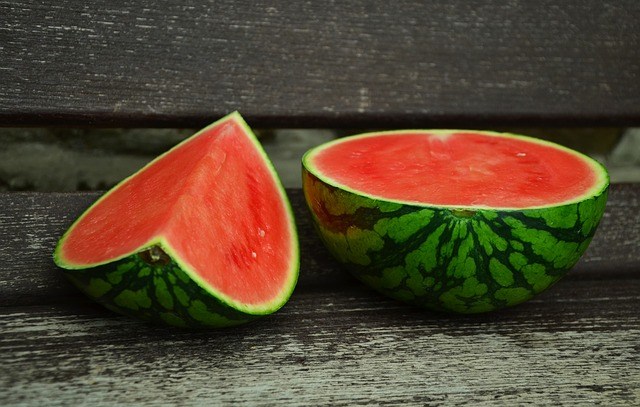
While watermelon can be a healthy treat for guinea pigs when fed in moderation, consuming too much of it can pose risks.
The high sugar content in watermelon can cause digestive issues such as diarrhea, bloating, and upset stomach in guinea pigs. The excess sugar can also lead to weight gain and other health problems if fed in excess.
Additionally, guinea pigs have a sensitive digestive system, and sudden changes in their diet, including consuming too much watermelon, can cause digestive upsets. It is crucial to introduce any new foods slowly and look out for any signs of digestive upsets, even aside from watermelons.
Can Guinea Pigs Eat Watermelon Rind?
In addition to the flesh, guinea pigs can also eat the watermelon rind. Many even consider the rind to be healthier than the flesh because of the lower sugar content.
Since the rind has a different consistency and nutritional content than the watermelon flesh, be sure to monitor your guinea pig’s reaction to the food. Remember to keep the portions small and to feed them only in moderation.
Can Guinea Pigs Eat Watermelon Seeds?
Although watermelon seeds are generally not considered toxic to guinea pigs, they are not recommended for guinea pigs as they pose a choking hazard. They can also cause digestive problems if ingested in large amounts. It’s best to remove all seeds from the watermelon before feeding it to your guinea pig to ensure their safety.
Other Fruits That You Can Feed Your Guinea Pigs
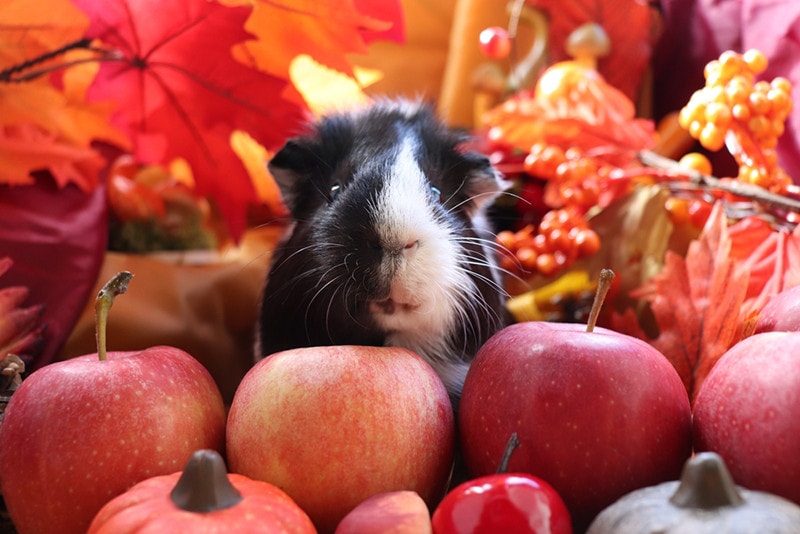
Guinea pigs are herbivores and require a diet that is high in fiber and vitamin C. While watermelon can be a safe and occasional treat, it’s important to provide a balanced and varied diet for your guinea pig. Here are some other fruits that are safe for guinea pigs to eat in moderation:
- Apples
- Strawberries
- Grapes
- Oranges
- Blueberries
- Banana
- Kiwi
- Raspberry
- Papaya
- Mango
Final Thoughts
As guinea pig parents, we want to keep our guinea pig healthy. Watermelon can be a healthy treat for guinea pigs when fed in small amounts occasionally. It can also provide some health benefits such as hydration, vitamin C, antioxidants, and enrichment for guinea pigs.
However, it’s important to remember that watermelon, like all fruits, should not be a staple food in their diet due to their high sugar content. Always monitor your guinea pig’s reaction to watermelon and consult with a veterinarian for any dietary concerns or questions. As with any food, moderation and balance are key to maintaining a healthy diet for your guinea pig.
Featured Image Credit: MaraZe, Shutterstock



